Conveyancing Law and Practice PDCV108 Session 1 Examination Answer
VerifiedAdded on 2022/12/26
|9
|2033
|68
Homework Assignment
AI Summary
This assignment solution addresses key aspects of conveyancing law and practice, focusing on the legal instruments of power of attorney and tenancy agreements. It examines the enduring power of attorney, its implications, and the roles of attorneys, referencing relevant legislation such as the Powers of Attorney Act 2003 and the Conveyancing Act 1919. The solution also provides a detailed case study involving a conveyancer, Charles Rasberry, highlighting issues related to financial record-keeping, trust account management, and compliance with the Conveyancers Licensing Act 2003. Furthermore, the assignment explores tenancy agreements, emphasizing the importance of clear clauses regarding property access, utilities, and tenant rights, including the redrafting of a lease agreement clause to ensure legal compliance. The solution provides a comprehensive understanding of property law and legal obligations.
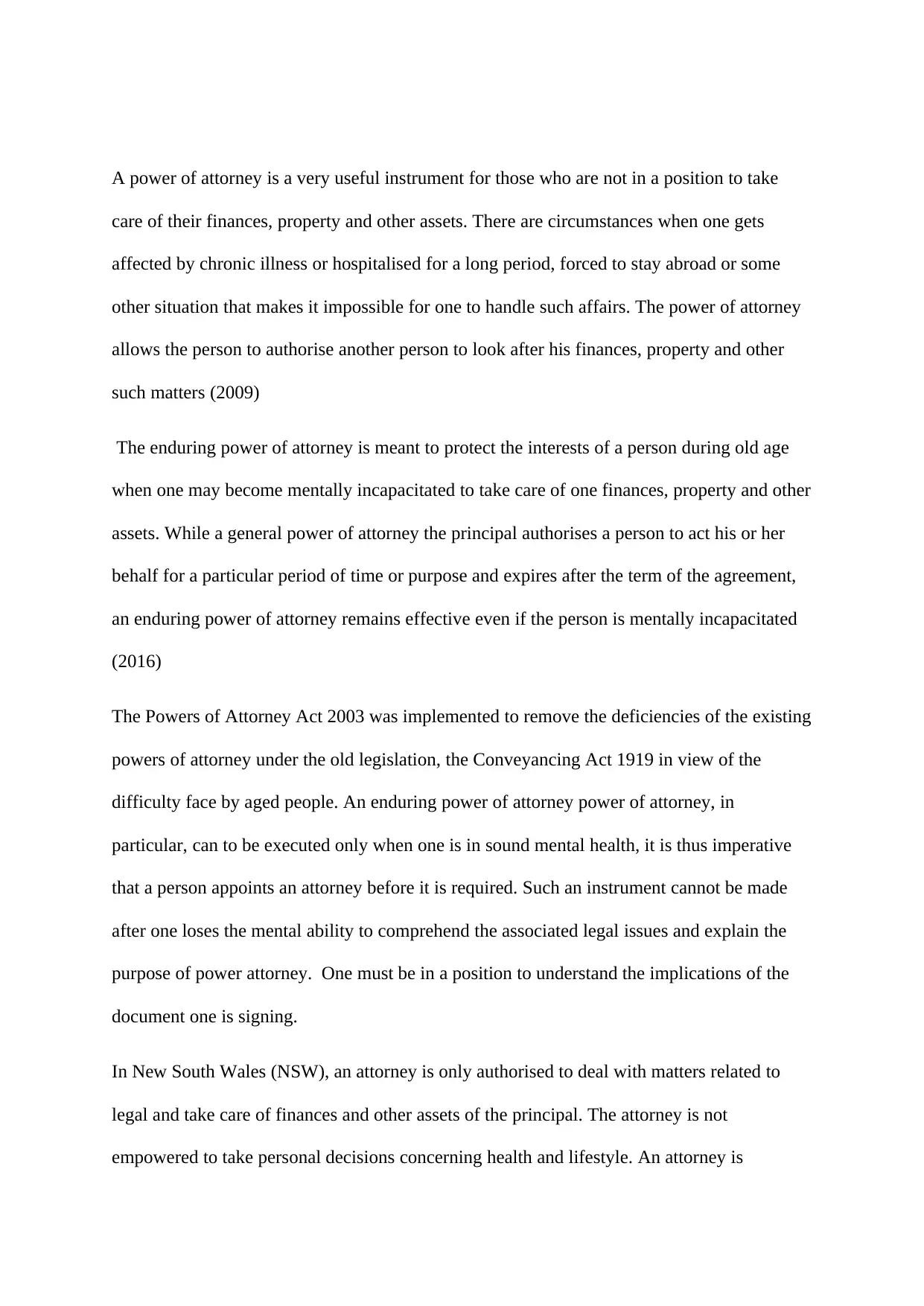
A power of attorney is a very useful instrument for those who are not in a position to take
care of their finances, property and other assets. There are circumstances when one gets
affected by chronic illness or hospitalised for a long period, forced to stay abroad or some
other situation that makes it impossible for one to handle such affairs. The power of attorney
allows the person to authorise another person to look after his finances, property and other
such matters (2009)
The enduring power of attorney is meant to protect the interests of a person during old age
when one may become mentally incapacitated to take care of one finances, property and other
assets. While a general power of attorney the principal authorises a person to act his or her
behalf for a particular period of time or purpose and expires after the term of the agreement,
an enduring power of attorney remains effective even if the person is mentally incapacitated
(2016)
The Powers of Attorney Act 2003 was implemented to remove the deficiencies of the existing
powers of attorney under the old legislation, the Conveyancing Act 1919 in view of the
difficulty face by aged people. An enduring power of attorney power of attorney, in
particular, can to be executed only when one is in sound mental health, it is thus imperative
that a person appoints an attorney before it is required. Such an instrument cannot be made
after one loses the mental ability to comprehend the associated legal issues and explain the
purpose of power attorney. One must be in a position to understand the implications of the
document one is signing.
In New South Wales (NSW), an attorney is only authorised to deal with matters related to
legal and take care of finances and other assets of the principal. The attorney is not
empowered to take personal decisions concerning health and lifestyle. An attorney is
care of their finances, property and other assets. There are circumstances when one gets
affected by chronic illness or hospitalised for a long period, forced to stay abroad or some
other situation that makes it impossible for one to handle such affairs. The power of attorney
allows the person to authorise another person to look after his finances, property and other
such matters (2009)
The enduring power of attorney is meant to protect the interests of a person during old age
when one may become mentally incapacitated to take care of one finances, property and other
assets. While a general power of attorney the principal authorises a person to act his or her
behalf for a particular period of time or purpose and expires after the term of the agreement,
an enduring power of attorney remains effective even if the person is mentally incapacitated
(2016)
The Powers of Attorney Act 2003 was implemented to remove the deficiencies of the existing
powers of attorney under the old legislation, the Conveyancing Act 1919 in view of the
difficulty face by aged people. An enduring power of attorney power of attorney, in
particular, can to be executed only when one is in sound mental health, it is thus imperative
that a person appoints an attorney before it is required. Such an instrument cannot be made
after one loses the mental ability to comprehend the associated legal issues and explain the
purpose of power attorney. One must be in a position to understand the implications of the
document one is signing.
In New South Wales (NSW), an attorney is only authorised to deal with matters related to
legal and take care of finances and other assets of the principal. The attorney is not
empowered to take personal decisions concerning health and lifestyle. An attorney is
Paraphrase This Document
Need a fresh take? Get an instant paraphrase of this document with our AI Paraphraser
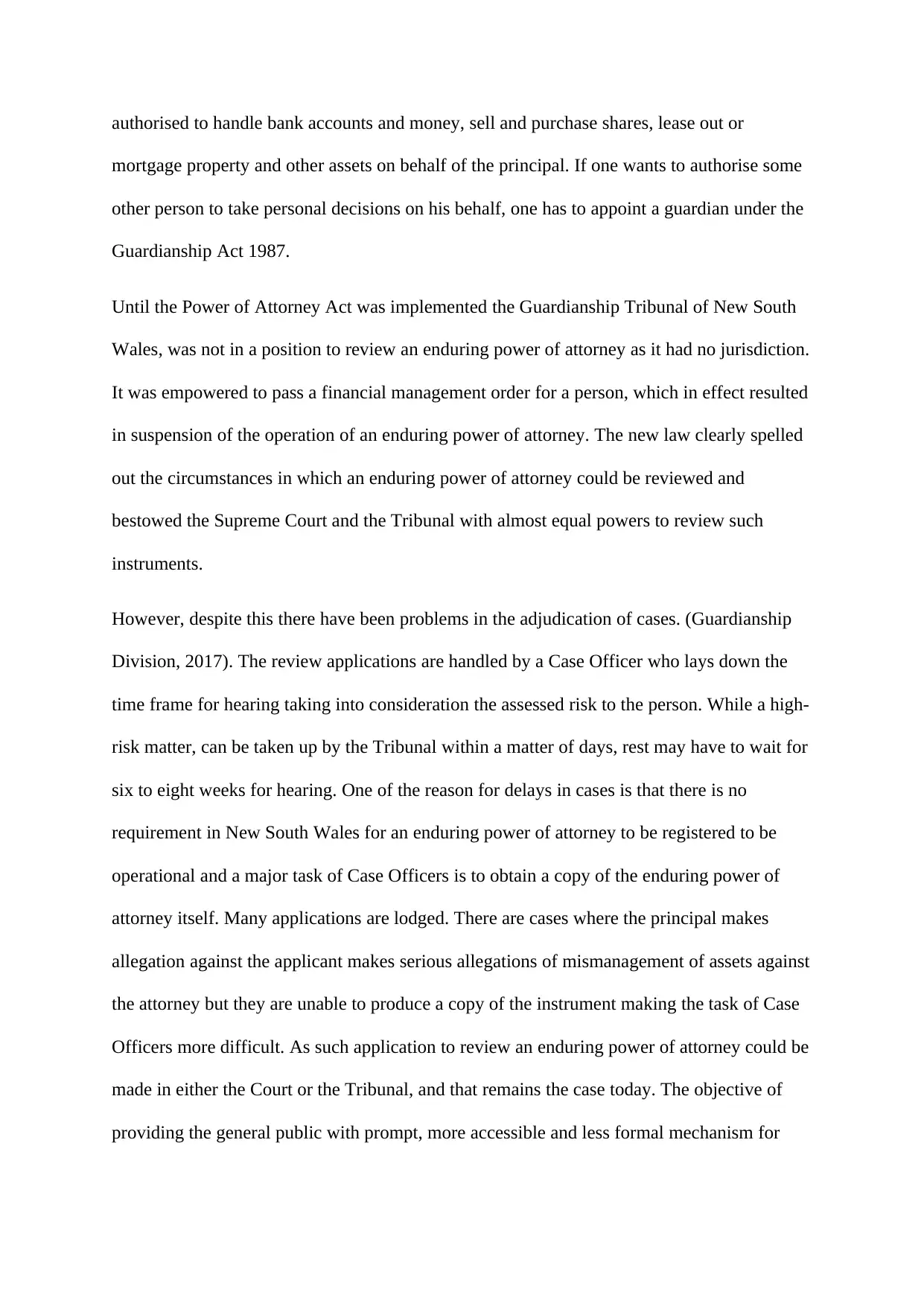
authorised to handle bank accounts and money, sell and purchase shares, lease out or
mortgage property and other assets on behalf of the principal. If one wants to authorise some
other person to take personal decisions on his behalf, one has to appoint a guardian under the
Guardianship Act 1987.
Until the Power of Attorney Act was implemented the Guardianship Tribunal of New South
Wales, was not in a position to review an enduring power of attorney as it had no jurisdiction.
It was empowered to pass a financial management order for a person, which in effect resulted
in suspension of the operation of an enduring power of attorney. The new law clearly spelled
out the circumstances in which an enduring power of attorney could be reviewed and
bestowed the Supreme Court and the Tribunal with almost equal powers to review such
instruments.
However, despite this there have been problems in the adjudication of cases. (Guardianship
Division, 2017). The review applications are handled by a Case Officer who lays down the
time frame for hearing taking into consideration the assessed risk to the person. While a high-
risk matter, can be taken up by the Tribunal within a matter of days, rest may have to wait for
six to eight weeks for hearing. One of the reason for delays in cases is that there is no
requirement in New South Wales for an enduring power of attorney to be registered to be
operational and a major task of Case Officers is to obtain a copy of the enduring power of
attorney itself. Many applications are lodged. There are cases where the principal makes
allegation against the applicant makes serious allegations of mismanagement of assets against
the attorney but they are unable to produce a copy of the instrument making the task of Case
Officers more difficult. As such application to review an enduring power of attorney could be
made in either the Court or the Tribunal, and that remains the case today. The objective of
providing the general public with prompt, more accessible and less formal mechanism for
mortgage property and other assets on behalf of the principal. If one wants to authorise some
other person to take personal decisions on his behalf, one has to appoint a guardian under the
Guardianship Act 1987.
Until the Power of Attorney Act was implemented the Guardianship Tribunal of New South
Wales, was not in a position to review an enduring power of attorney as it had no jurisdiction.
It was empowered to pass a financial management order for a person, which in effect resulted
in suspension of the operation of an enduring power of attorney. The new law clearly spelled
out the circumstances in which an enduring power of attorney could be reviewed and
bestowed the Supreme Court and the Tribunal with almost equal powers to review such
instruments.
However, despite this there have been problems in the adjudication of cases. (Guardianship
Division, 2017). The review applications are handled by a Case Officer who lays down the
time frame for hearing taking into consideration the assessed risk to the person. While a high-
risk matter, can be taken up by the Tribunal within a matter of days, rest may have to wait for
six to eight weeks for hearing. One of the reason for delays in cases is that there is no
requirement in New South Wales for an enduring power of attorney to be registered to be
operational and a major task of Case Officers is to obtain a copy of the enduring power of
attorney itself. Many applications are lodged. There are cases where the principal makes
allegation against the applicant makes serious allegations of mismanagement of assets against
the attorney but they are unable to produce a copy of the instrument making the task of Case
Officers more difficult. As such application to review an enduring power of attorney could be
made in either the Court or the Tribunal, and that remains the case today. The objective of
providing the general public with prompt, more accessible and less formal mechanism for
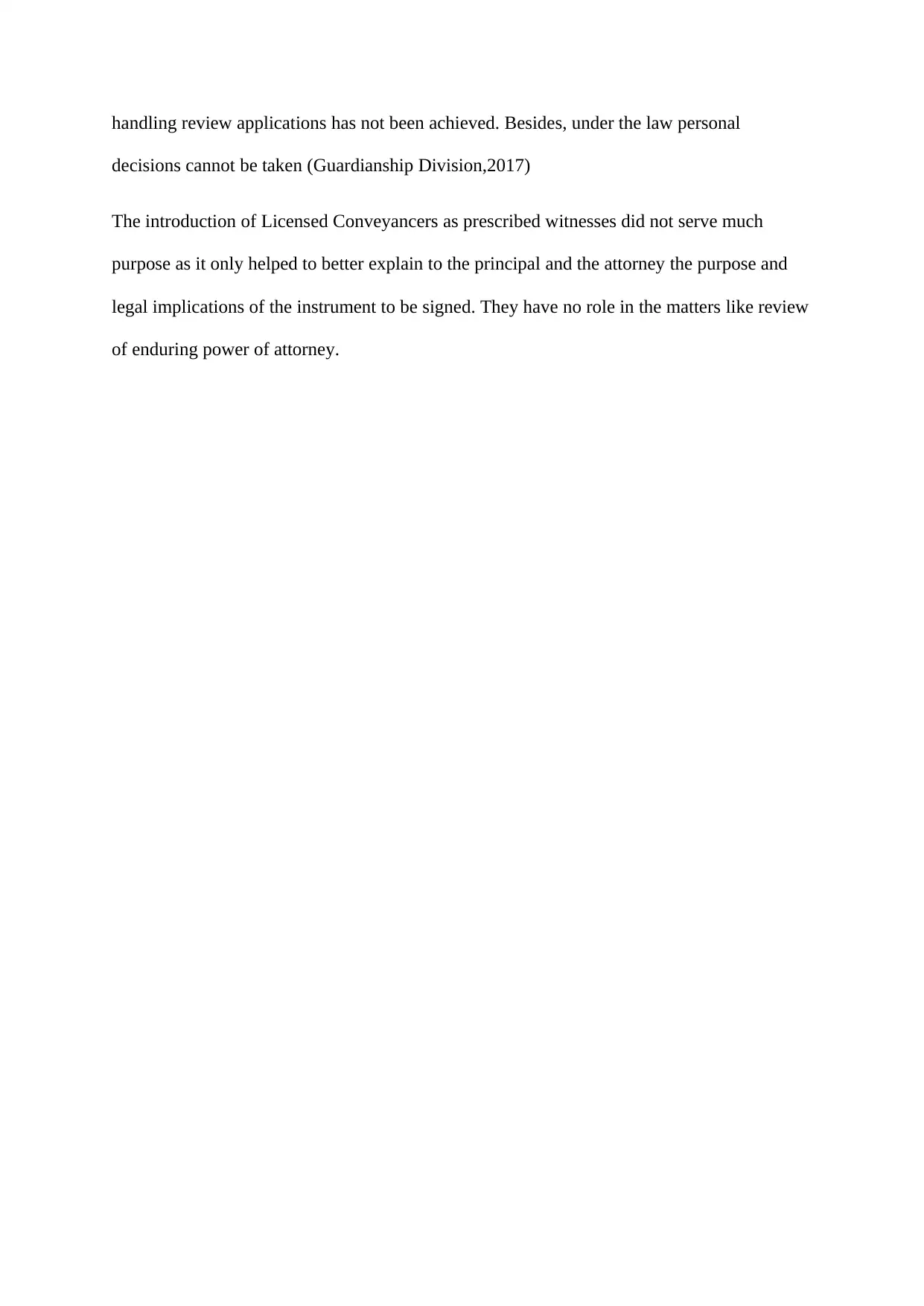
handling review applications has not been achieved. Besides, under the law personal
decisions cannot be taken (Guardianship Division,2017)
The introduction of Licensed Conveyancers as prescribed witnesses did not serve much
purpose as it only helped to better explain to the principal and the attorney the purpose and
legal implications of the instrument to be signed. They have no role in the matters like review
of enduring power of attorney.
decisions cannot be taken (Guardianship Division,2017)
The introduction of Licensed Conveyancers as prescribed witnesses did not serve much
purpose as it only helped to better explain to the principal and the attorney the purpose and
legal implications of the instrument to be signed. They have no role in the matters like review
of enduring power of attorney.
⊘ This is a preview!⊘
Do you want full access?
Subscribe today to unlock all pages.

Trusted by 1+ million students worldwide
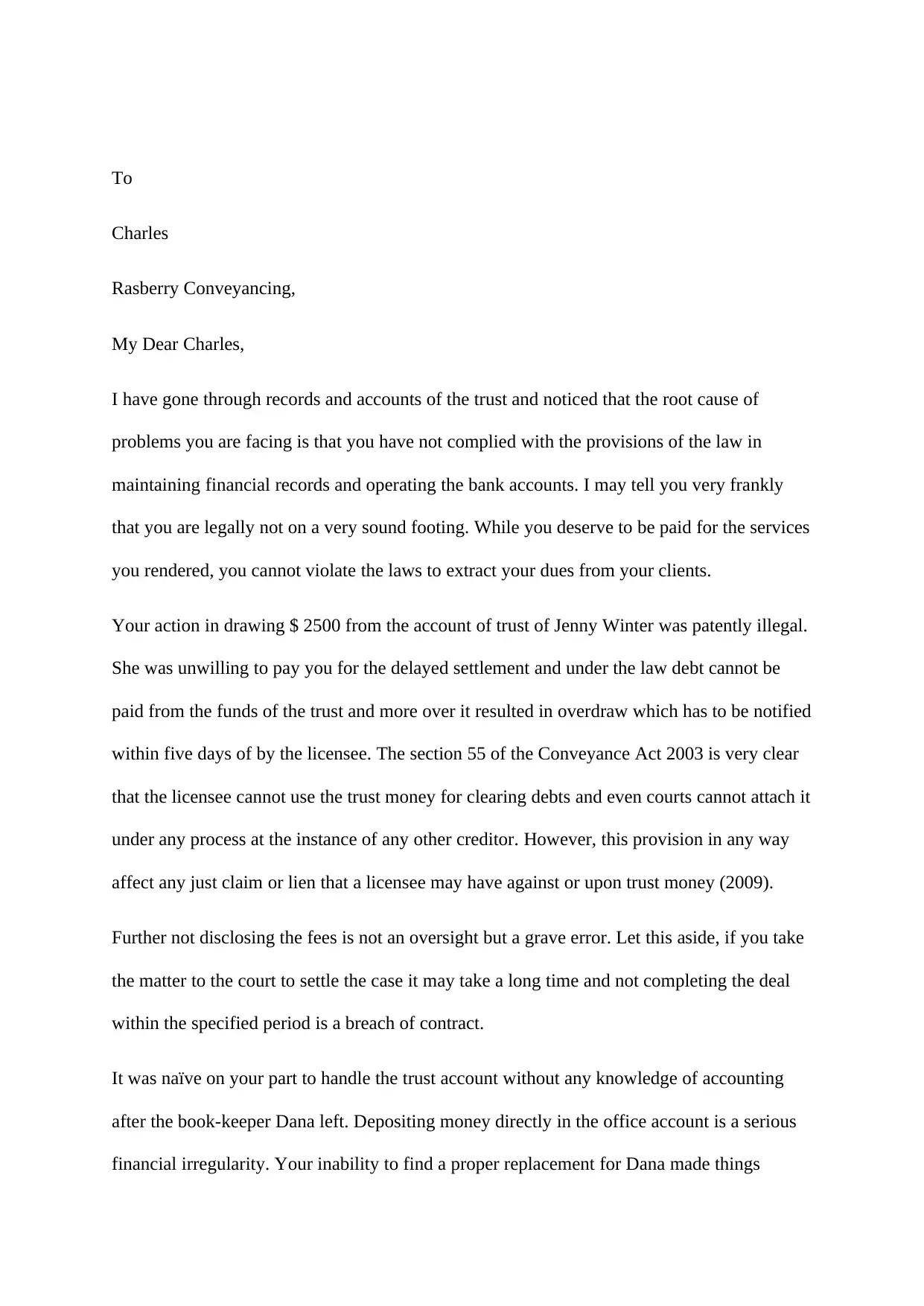
To
Charles
Rasberry Conveyancing,
My Dear Charles,
I have gone through records and accounts of the trust and noticed that the root cause of
problems you are facing is that you have not complied with the provisions of the law in
maintaining financial records and operating the bank accounts. I may tell you very frankly
that you are legally not on a very sound footing. While you deserve to be paid for the services
you rendered, you cannot violate the laws to extract your dues from your clients.
Your action in drawing $ 2500 from the account of trust of Jenny Winter was patently illegal.
She was unwilling to pay you for the delayed settlement and under the law debt cannot be
paid from the funds of the trust and more over it resulted in overdraw which has to be notified
within five days of by the licensee. The section 55 of the Conveyance Act 2003 is very clear
that the licensee cannot use the trust money for clearing debts and even courts cannot attach it
under any process at the instance of any other creditor. However, this provision in any way
affect any just claim or lien that a licensee may have against or upon trust money (2009).
Further not disclosing the fees is not an oversight but a grave error. Let this aside, if you take
the matter to the court to settle the case it may take a long time and not completing the deal
within the specified period is a breach of contract.
It was naïve on your part to handle the trust account without any knowledge of accounting
after the book-keeper Dana left. Depositing money directly in the office account is a serious
financial irregularity. Your inability to find a proper replacement for Dana made things
Charles
Rasberry Conveyancing,
My Dear Charles,
I have gone through records and accounts of the trust and noticed that the root cause of
problems you are facing is that you have not complied with the provisions of the law in
maintaining financial records and operating the bank accounts. I may tell you very frankly
that you are legally not on a very sound footing. While you deserve to be paid for the services
you rendered, you cannot violate the laws to extract your dues from your clients.
Your action in drawing $ 2500 from the account of trust of Jenny Winter was patently illegal.
She was unwilling to pay you for the delayed settlement and under the law debt cannot be
paid from the funds of the trust and more over it resulted in overdraw which has to be notified
within five days of by the licensee. The section 55 of the Conveyance Act 2003 is very clear
that the licensee cannot use the trust money for clearing debts and even courts cannot attach it
under any process at the instance of any other creditor. However, this provision in any way
affect any just claim or lien that a licensee may have against or upon trust money (2009).
Further not disclosing the fees is not an oversight but a grave error. Let this aside, if you take
the matter to the court to settle the case it may take a long time and not completing the deal
within the specified period is a breach of contract.
It was naïve on your part to handle the trust account without any knowledge of accounting
after the book-keeper Dana left. Depositing money directly in the office account is a serious
financial irregularity. Your inability to find a proper replacement for Dana made things
Paraphrase This Document
Need a fresh take? Get an instant paraphrase of this document with our AI Paraphraser
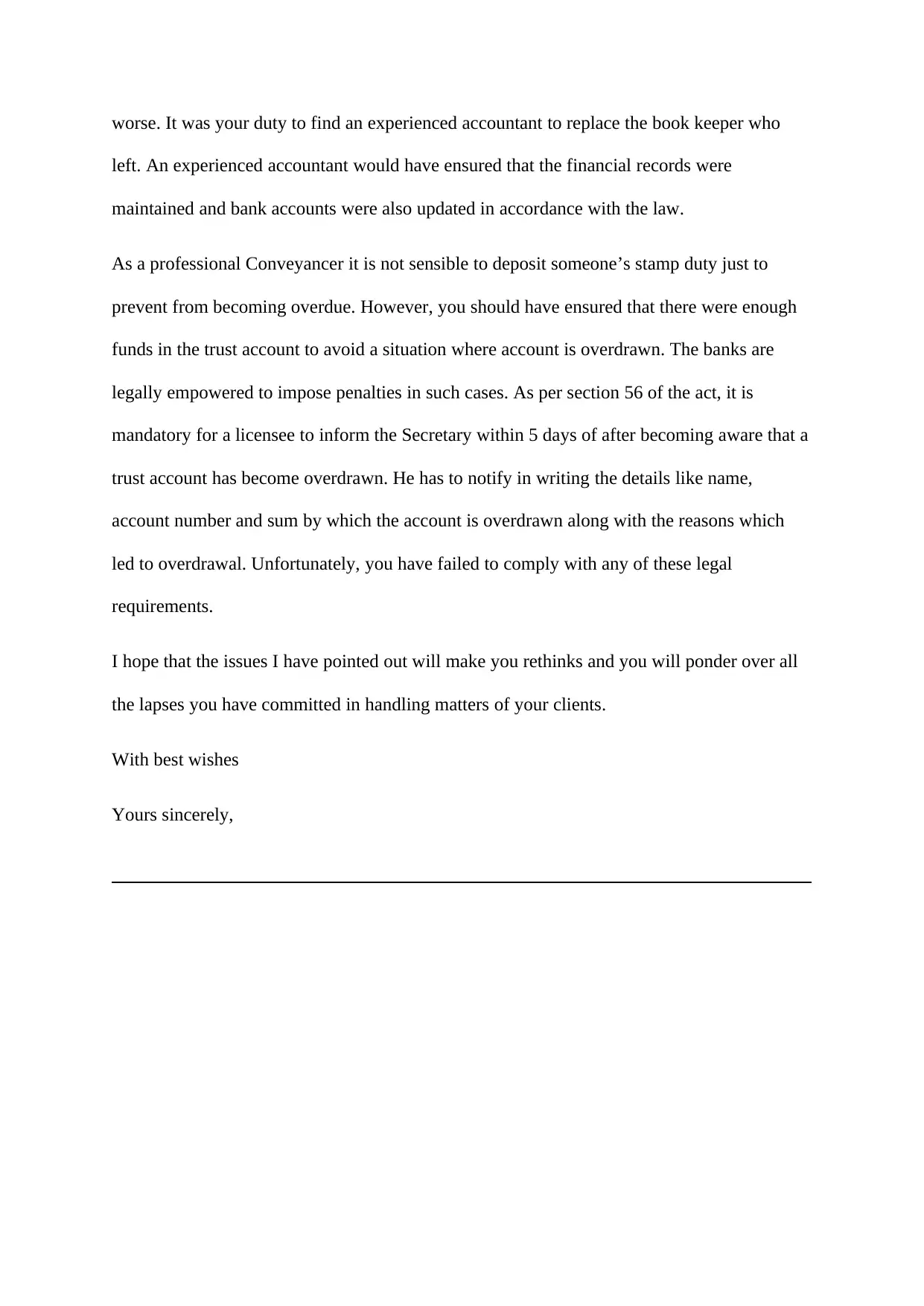
worse. It was your duty to find an experienced accountant to replace the book keeper who
left. An experienced accountant would have ensured that the financial records were
maintained and bank accounts were also updated in accordance with the law.
As a professional Conveyancer it is not sensible to deposit someone’s stamp duty just to
prevent from becoming overdue. However, you should have ensured that there were enough
funds in the trust account to avoid a situation where account is overdrawn. The banks are
legally empowered to impose penalties in such cases. As per section 56 of the act, it is
mandatory for a licensee to inform the Secretary within 5 days of after becoming aware that a
trust account has become overdrawn. He has to notify in writing the details like name,
account number and sum by which the account is overdrawn along with the reasons which
led to overdrawal. Unfortunately, you have failed to comply with any of these legal
requirements.
I hope that the issues I have pointed out will make you rethinks and you will ponder over all
the lapses you have committed in handling matters of your clients.
With best wishes
Yours sincerely,
left. An experienced accountant would have ensured that the financial records were
maintained and bank accounts were also updated in accordance with the law.
As a professional Conveyancer it is not sensible to deposit someone’s stamp duty just to
prevent from becoming overdue. However, you should have ensured that there were enough
funds in the trust account to avoid a situation where account is overdrawn. The banks are
legally empowered to impose penalties in such cases. As per section 56 of the act, it is
mandatory for a licensee to inform the Secretary within 5 days of after becoming aware that a
trust account has become overdrawn. He has to notify in writing the details like name,
account number and sum by which the account is overdrawn along with the reasons which
led to overdrawal. Unfortunately, you have failed to comply with any of these legal
requirements.
I hope that the issues I have pointed out will make you rethinks and you will ponder over all
the lapses you have committed in handling matters of your clients.
With best wishes
Yours sincerely,
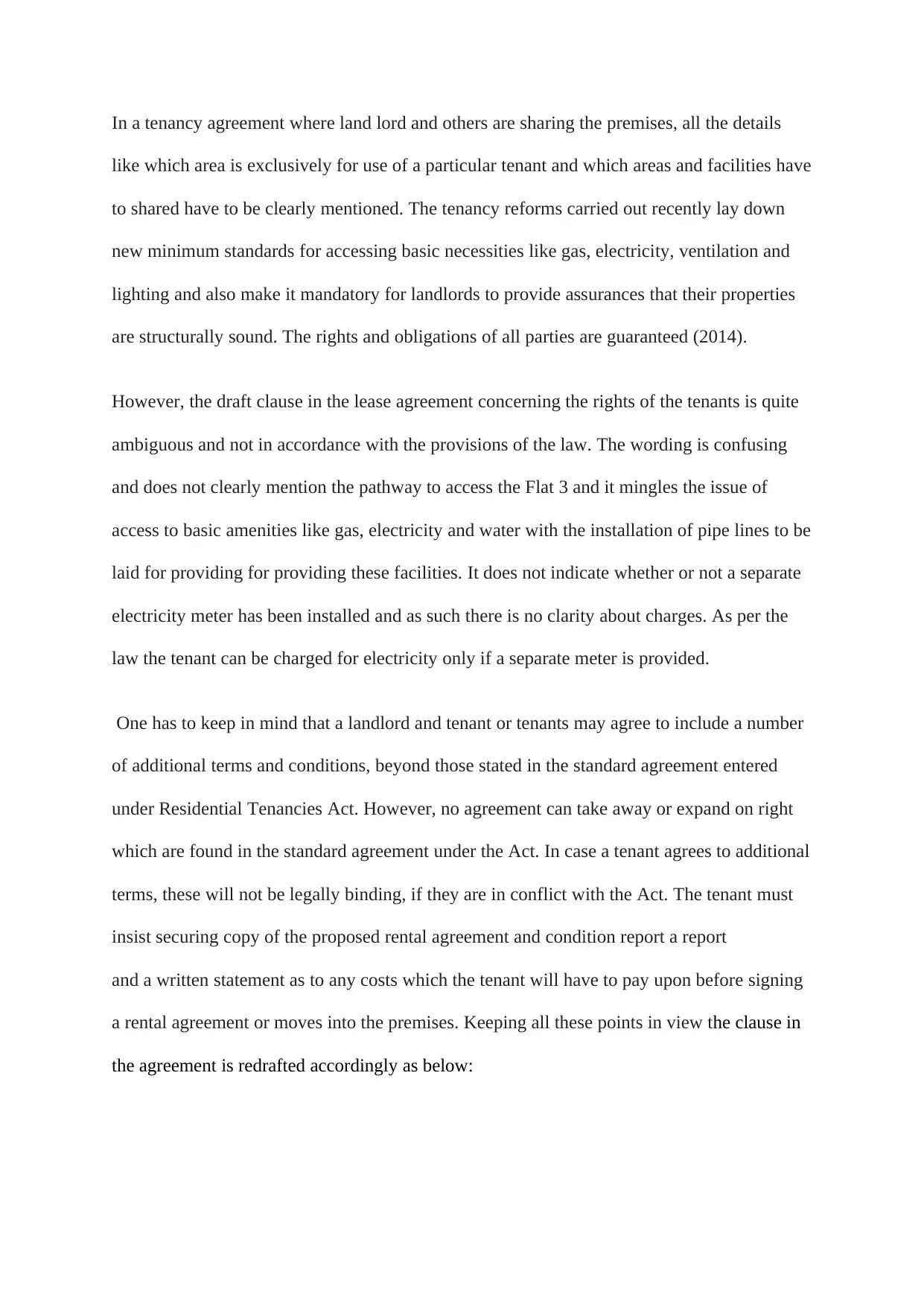
In a tenancy agreement where land lord and others are sharing the premises, all the details
like which area is exclusively for use of a particular tenant and which areas and facilities have
to shared have to be clearly mentioned. The tenancy reforms carried out recently lay down
new minimum standards for accessing basic necessities like gas, electricity, ventilation and
lighting and also make it mandatory for landlords to provide assurances that their properties
are structurally sound. The rights and obligations of all parties are guaranteed (2014).
However, the draft clause in the lease agreement concerning the rights of the tenants is quite
ambiguous and not in accordance with the provisions of the law. The wording is confusing
and does not clearly mention the pathway to access the Flat 3 and it mingles the issue of
access to basic amenities like gas, electricity and water with the installation of pipe lines to be
laid for providing for providing these facilities. It does not indicate whether or not a separate
electricity meter has been installed and as such there is no clarity about charges. As per the
law the tenant can be charged for electricity only if a separate meter is provided.
One has to keep in mind that a landlord and tenant or tenants may agree to include a number
of additional terms and conditions, beyond those stated in the standard agreement entered
under Residential Tenancies Act. However, no agreement can take away or expand on right
which are found in the standard agreement under the Act. In case a tenant agrees to additional
terms, these will not be legally binding, if they are in conflict with the Act. The tenant must
insist securing copy of the proposed rental agreement and condition report a report
and a written statement as to any costs which the tenant will have to pay upon before signing
a rental agreement or moves into the premises. Keeping all these points in view the clause in
the agreement is redrafted accordingly as below:
like which area is exclusively for use of a particular tenant and which areas and facilities have
to shared have to be clearly mentioned. The tenancy reforms carried out recently lay down
new minimum standards for accessing basic necessities like gas, electricity, ventilation and
lighting and also make it mandatory for landlords to provide assurances that their properties
are structurally sound. The rights and obligations of all parties are guaranteed (2014).
However, the draft clause in the lease agreement concerning the rights of the tenants is quite
ambiguous and not in accordance with the provisions of the law. The wording is confusing
and does not clearly mention the pathway to access the Flat 3 and it mingles the issue of
access to basic amenities like gas, electricity and water with the installation of pipe lines to be
laid for providing for providing these facilities. It does not indicate whether or not a separate
electricity meter has been installed and as such there is no clarity about charges. As per the
law the tenant can be charged for electricity only if a separate meter is provided.
One has to keep in mind that a landlord and tenant or tenants may agree to include a number
of additional terms and conditions, beyond those stated in the standard agreement entered
under Residential Tenancies Act. However, no agreement can take away or expand on right
which are found in the standard agreement under the Act. In case a tenant agrees to additional
terms, these will not be legally binding, if they are in conflict with the Act. The tenant must
insist securing copy of the proposed rental agreement and condition report a report
and a written statement as to any costs which the tenant will have to pay upon before signing
a rental agreement or moves into the premises. Keeping all these points in view the clause in
the agreement is redrafted accordingly as below:
⊘ This is a preview!⊘
Do you want full access?
Subscribe today to unlock all pages.

Trusted by 1+ million students worldwide
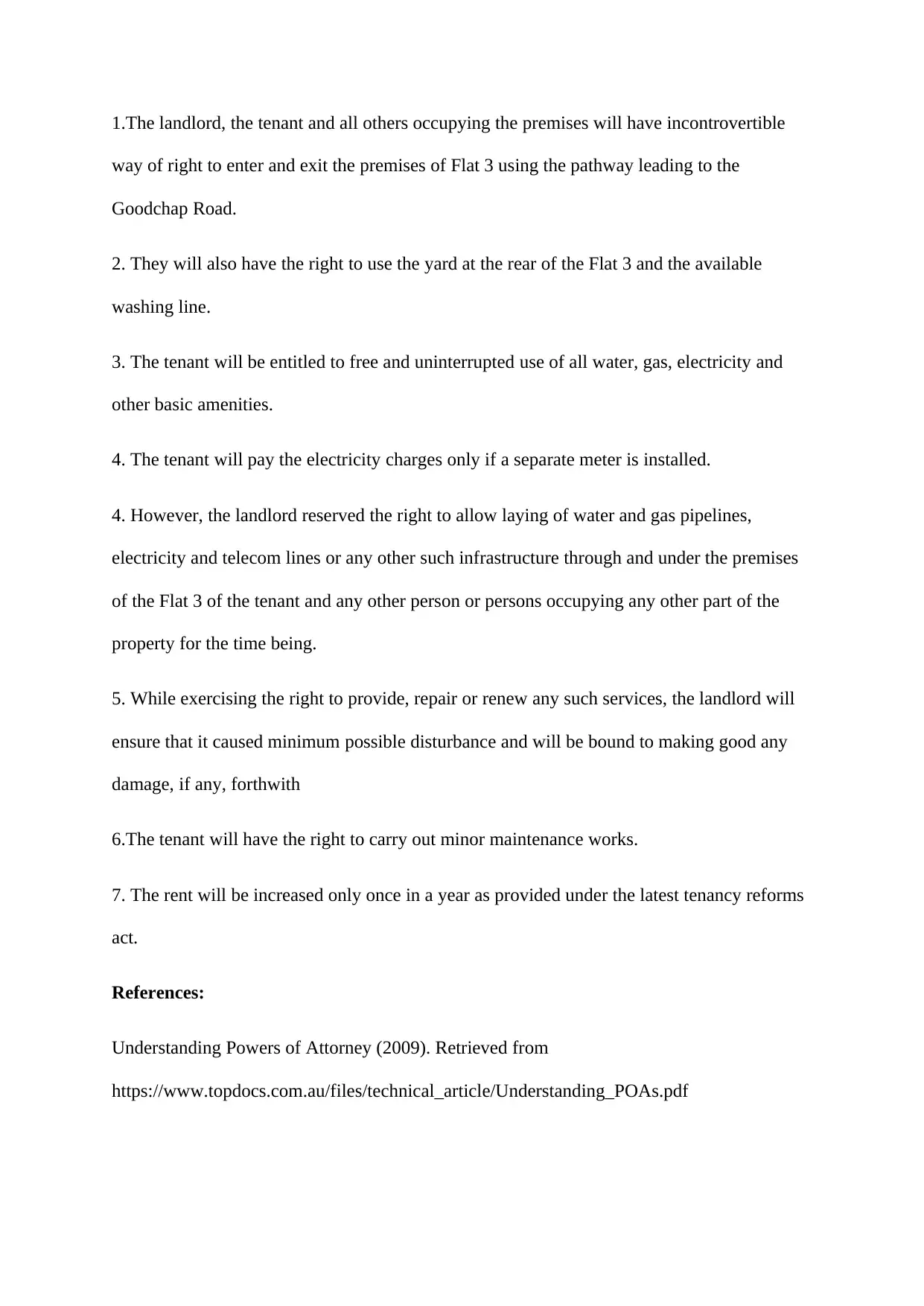
1.The landlord, the tenant and all others occupying the premises will have incontrovertible
way of right to enter and exit the premises of Flat 3 using the pathway leading to the
Goodchap Road.
2. They will also have the right to use the yard at the rear of the Flat 3 and the available
washing line.
3. The tenant will be entitled to free and uninterrupted use of all water, gas, electricity and
other basic amenities.
4. The tenant will pay the electricity charges only if a separate meter is installed.
4. However, the landlord reserved the right to allow laying of water and gas pipelines,
electricity and telecom lines or any other such infrastructure through and under the premises
of the Flat 3 of the tenant and any other person or persons occupying any other part of the
property for the time being.
5. While exercising the right to provide, repair or renew any such services, the landlord will
ensure that it caused minimum possible disturbance and will be bound to making good any
damage, if any, forthwith
6.The tenant will have the right to carry out minor maintenance works.
7. The rent will be increased only once in a year as provided under the latest tenancy reforms
act.
References:
Understanding Powers of Attorney (2009). Retrieved from
https://www.topdocs.com.au/files/technical_article/Understanding_POAs.pdf
way of right to enter and exit the premises of Flat 3 using the pathway leading to the
Goodchap Road.
2. They will also have the right to use the yard at the rear of the Flat 3 and the available
washing line.
3. The tenant will be entitled to free and uninterrupted use of all water, gas, electricity and
other basic amenities.
4. The tenant will pay the electricity charges only if a separate meter is installed.
4. However, the landlord reserved the right to allow laying of water and gas pipelines,
electricity and telecom lines or any other such infrastructure through and under the premises
of the Flat 3 of the tenant and any other person or persons occupying any other part of the
property for the time being.
5. While exercising the right to provide, repair or renew any such services, the landlord will
ensure that it caused minimum possible disturbance and will be bound to making good any
damage, if any, forthwith
6.The tenant will have the right to carry out minor maintenance works.
7. The rent will be increased only once in a year as provided under the latest tenancy reforms
act.
References:
Understanding Powers of Attorney (2009). Retrieved from
https://www.topdocs.com.au/files/technical_article/Understanding_POAs.pdf
Paraphrase This Document
Need a fresh take? Get an instant paraphrase of this document with our AI Paraphraser
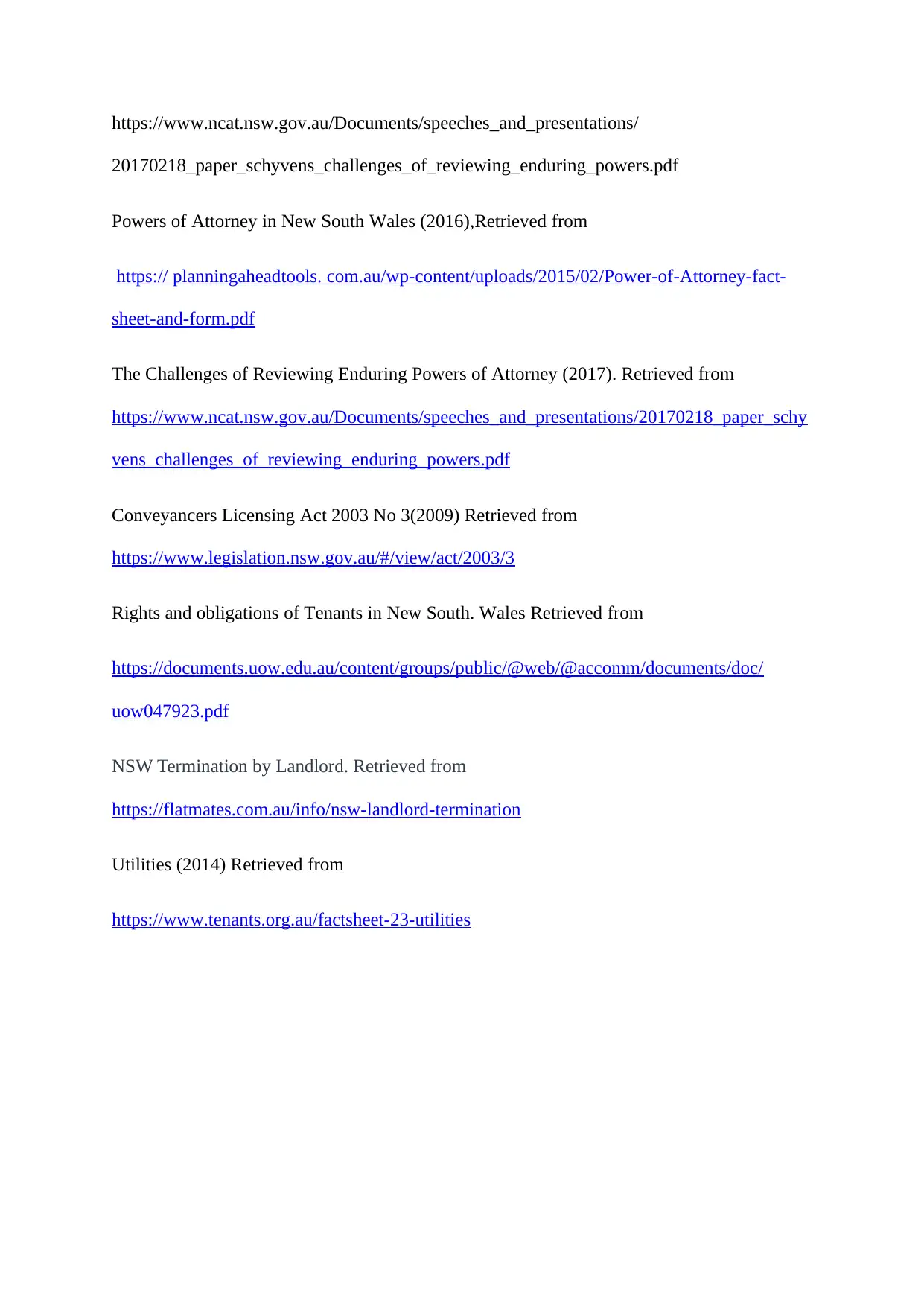
https://www.ncat.nsw.gov.au/Documents/speeches_and_presentations/
20170218_paper_schyvens_challenges_of_reviewing_enduring_powers.pdf
Powers of Attorney in New South Wales (2016),Retrieved from
https:// planningaheadtools. com.au/wp-content/uploads/2015/02/Power-of-Attorney-fact-
sheet-and-form.pdf
The Challenges of Reviewing Enduring Powers of Attorney (2017). Retrieved from
https://www.ncat.nsw.gov.au/Documents/speeches_and_presentations/20170218_paper_schy
vens_challenges_of_reviewing_enduring_powers.pdf
Conveyancers Licensing Act 2003 No 3(2009) Retrieved from
https://www.legislation.nsw.gov.au/#/view/act/2003/3
Rights and obligations of Tenants in New South. Wales Retrieved from
https://documents.uow.edu.au/content/groups/public/@web/@accomm/documents/doc/
uow047923.pdf
NSW Termination by Landlord. Retrieved from
https://flatmates.com.au/info/nsw-landlord-termination
Utilities (2014) Retrieved from
https://www.tenants.org.au/factsheet-23-utilities
20170218_paper_schyvens_challenges_of_reviewing_enduring_powers.pdf
Powers of Attorney in New South Wales (2016),Retrieved from
https:// planningaheadtools. com.au/wp-content/uploads/2015/02/Power-of-Attorney-fact-
sheet-and-form.pdf
The Challenges of Reviewing Enduring Powers of Attorney (2017). Retrieved from
https://www.ncat.nsw.gov.au/Documents/speeches_and_presentations/20170218_paper_schy
vens_challenges_of_reviewing_enduring_powers.pdf
Conveyancers Licensing Act 2003 No 3(2009) Retrieved from
https://www.legislation.nsw.gov.au/#/view/act/2003/3
Rights and obligations of Tenants in New South. Wales Retrieved from
https://documents.uow.edu.au/content/groups/public/@web/@accomm/documents/doc/
uow047923.pdf
NSW Termination by Landlord. Retrieved from
https://flatmates.com.au/info/nsw-landlord-termination
Utilities (2014) Retrieved from
https://www.tenants.org.au/factsheet-23-utilities

⊘ This is a preview!⊘
Do you want full access?
Subscribe today to unlock all pages.

Trusted by 1+ million students worldwide
1 out of 9
Related Documents
Your All-in-One AI-Powered Toolkit for Academic Success.
+13062052269
info@desklib.com
Available 24*7 on WhatsApp / Email
![[object Object]](/_next/static/media/star-bottom.7253800d.svg)
Unlock your academic potential
Copyright © 2020–2026 A2Z Services. All Rights Reserved. Developed and managed by ZUCOL.



